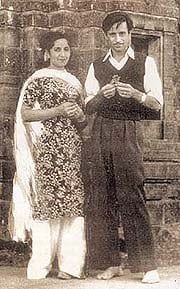An orginal Spanish poem very touching indeed --translated to
English ,Marathi by me from the translated French version of the poem (I
do not know Spanish )
Hope you like it
Subodh 1 st December
original
¡Qué suerte no ser una madre palestina,
ni una madre siria, ni una madre afgana,
ni una madre kurda,
ni una madre del cuerno de África !
Qué suerte no tener que... sostener
la muerte de mi hijo en mis brazos…
ese pequeño cuerpo
que se ha muerto sin más,
de hambre, de sed,
desangrado,
atravesado, zas, por una bala!
¡Qué suerte no tener que abrazar a mi hijo muerto
mientras mis ojos se resecan, lentamente,
de dolor, de impotencia,
de rabia contenida!
¡Qué suerte no tener que sortear cada día
el rostro enjuto y oscuro de la Parca,
y regalarle, esconderle, ocultarle
los rostros malditos de mis hijos,
que han nacido donde nada importan,
donde nada valen, donde nada son…!
Qué suerte, me repito cada día, qué suerte,
mientras mis hijos, tranquilos, duermen su infancia merecida.
ni una madre siria, ni una madre afgana,
ni una madre kurda,
ni una madre del cuerno de África !
Qué suerte no tener que... sostener
la muerte de mi hijo en mis brazos…
ese pequeño cuerpo
que se ha muerto sin más,
de hambre, de sed,
desangrado,
atravesado, zas, por una bala!
¡Qué suerte no tener que abrazar a mi hijo muerto
mientras mis ojos se resecan, lentamente,
de dolor, de impotencia,
de rabia contenida!
¡Qué suerte no tener que sortear cada día
el rostro enjuto y oscuro de la Parca,
y regalarle, esconderle, ocultarle
los rostros malditos de mis hijos,
que han nacido donde nada importan,
donde nada valen, donde nada son…!
Qué suerte, me repito cada día, qué suerte,
mientras mis hijos, tranquilos, duermen su infancia merecida.
------------------------------------------------------------------------------------------------------------------------------------------------------------------------------------------
English
The death of my son in my arms...
That little body
That has been dead
Lucky You I don't have to hold my dead son
While my eyes are wilting (getting dry -helpless), slowly,
Of pain, impotence,
impotence of a pent-up anger!
Lucky you I don't have to face each and every day
The face lean and sinister
What luck, I repeat every day, what luck.
While my son is quiet, Yours sleep (peacefully ) the way his childhood deserves
English
What luck! not (to be ) a Palestinian mother,
Nor a mother Syrian, nor a mother Afghan,
Nor a mother Kurdish
Nor a mother in the horn of Africa! (at Cape of good hope in Africa)
lucky you I don't ...have to holdNor a mother Syrian, nor a mother Afghan,
Nor a mother Kurdish
Nor a mother in the horn of Africa! (at Cape of good hope in Africa)
The death of my son in my arms...
That little body
That has been dead
no more, hunger, no thirst,
Bled out,
in a crosswire then bang -a bullet (ref to child being targeted at )
Bled out,
in a crosswire then bang -a bullet (ref to child being targeted at )
Lucky You I don't have to hold my dead son
While my eyes are wilting (getting dry -helpless), slowly,
Of pain, impotence,
impotence of a pent-up anger!
Lucky you I don't have to face each and every day
The face lean and sinister
of the grim reaper,(grim reaper ---alludes to death /terrorist )
And then give up , Hide, hide
the bleeding faces of my children.
The children born born where nothing matters ,
Where nothing is worth, where nothing is...!And then give up , Hide, hide
the bleeding faces of my children.
The children born born where nothing matters ,
What luck, I repeat every day, what luck.
While my son is quiet, Yours sleep (peacefully ) the way his childhood deserves
Poem by :Marisa Peña.
Poem published in the book "Indignhadas" Collective
Unary editions
Poem published in the book "Indignhadas" Collective
Unary editions
किती भाग्यवान तू ग बाई
तू नाहीस एक प्यालेस्तिनी आई
किवा सिरीयन ,अफगाण ,कुर्दिश
आफ्रिकन किवा तत्सम काही !
भाग्यवान तू बाई
माझ्या मृत बाळाला हातावर
माझ्यासारखे झेलावे लागत नाही ते छोट बाळ
मरून झालाय काही काळ
आता भूक नाही ,तहान नाही
रक्त ठिबकून ठिबकून काही उरलच नाही !
एक निशाणा ,एकच नेम ,ब्यांग- एक गोळी .बाकी काहीच नाही !!
भाग्यवान तू बाई
माझ्या मृत मुलाला हातावर झेलत
डोळे असे दूक्खाने षंढ रागाने पाझरत
दृष्टी मलूल कोरडी बनत जाई
ते तुझ्या नशिबी नाही !
भाग्यवान तू बाई
प्रत्येक दिवशी मृत्यूचा करडा कोरडा चेहरा
येत नाही असा तुझ्या सामोरा
आणि मग असहाय शरणागती ,त्याचाय्पासून पळ्ण
मुलांचे रक्ताळलेले चेहरे त्याच्यापासून लपवण
मुल जी उपजली जिथे काहीच महत्वाचे उपजत नाही
जिथे कशालाच मुल्य नाही ,खरच अगदी कशालाच नाही !
काय भाग्य !दिवसरात्र मी म्हणते काय भाग्य तुझे बाई
इथे माझा मुलगा 'शांत 'तुझा तिथे हक्काने
निवांत झोपी जाई !!
-------------------------------------------------------------------------------------------------------------------------------------------------------------------------------------------------------------
English Translation and Marathi Transformation by Subodh Bangalore Dec 15
note :Please mention original poet (not the translator )if you intend to share this poem with others
note :some liberty is used while putting words in English and Marathi to complete the meaning















